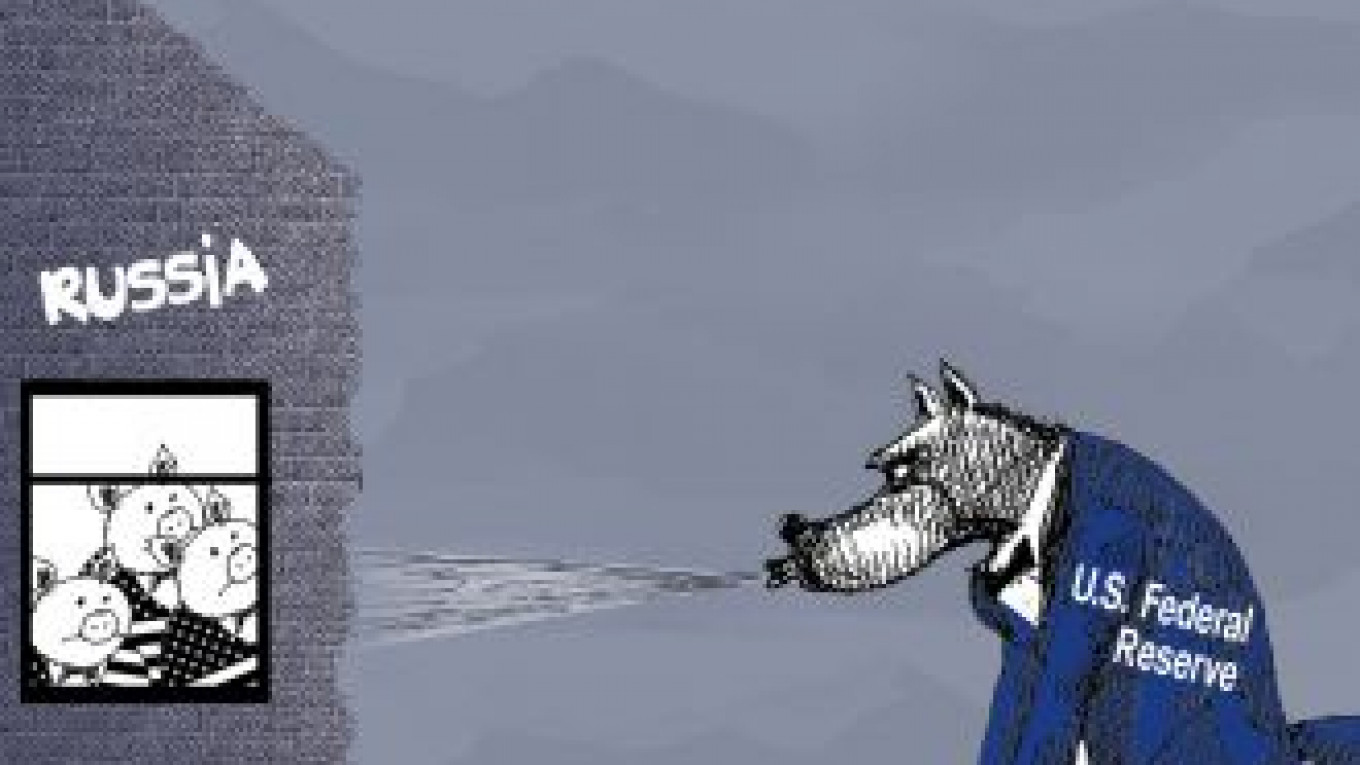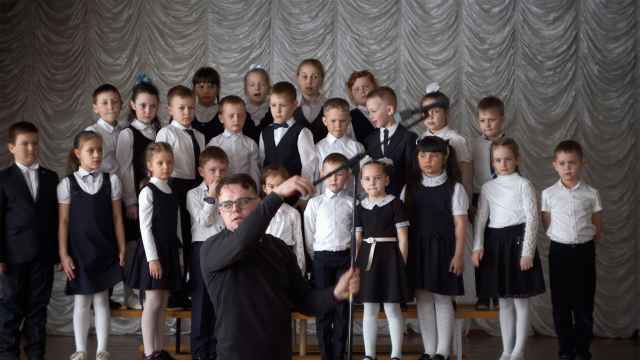For generations, parents have helped their children to sleep, or scared them into actually staying in bed, with tales of dragon-slaying heroes, princesses and monsters waiting to pounce on the unsuspecting. As it turns out, many adults have adopted a variation of this horror fairy-tale genre as a result of the succession of crises that have swept over the global economy. These have thrown up enough villains and scary plots to compete with anything written by the Brothers Grimm.
While the script to this horror story is being written, neither the script writers nor the hapless readers have any clear idea of how it will end. It involves the tale of Ben the Slayer squaring off against the Stimulus Dragon.
If the Federal Reserve curtails its quantitative easing program, it will have an impact on the wealth of Russians.
The slayer in this tale is U.S. Federal Reserve chairman Ben Bernanke. The beast he is attempting to kill is the quantitative easing program that has been costing the Federal Reserve up to $85 billion every month since December 2012. The money has been intended to stave off a further financial crisis while the green shoots of recovery are nurtured. The evidence that the U.S. economy is starting to recover is strong enough to allow the Federal Reserve to consider withdrawing, or scaling back, the monthly monetary injections. That is good news for the U.S. economy but poses a grave risk for those developing nations which have seen their respective economies and asset valuations grow fat on the back of the huge flow of Federal Reserve funds. The weapon of choice for Ben the Slayer is the "taper," or a drop; quantitative easing has already inflicted fear into the hearts of investors and financial regulators.
Of course, what is happening in global financial markets is neither a fairy tale nor a work of fiction. It is a real-life event which, depending on how it plays out, will have a huge impact on the world economy — especially in emerging economies — and will affect the wealth of Russians and others all across the globe for many years to come.
To understand why Russia needs to worry so much about what the Federal Reserve does, it is important to go back to the spring of 2009 when, faced with a collapsing global economy and the risk of an even greater meltdown in financial markets, the Federal Reserve and the world's other major central banks embarked on a program of quantitative easing. That involved pumping billions of dollars into the financial markets so that, in theory, it would be easier and cheaper for individuals and companies to manage their borrowings and allow them to resume normal business. The Federal Reserve alone has injected about $85 billion every month since the program began. You would think the U.S. plans to curtail these injections amid a recovery, which would be welcomed by financial markets since it would mean the world economy is back on a growth track. But this is not the case.
As always, there is a difference between the theory and what actually happened. Instead of immediately pumping up the economic recovery, most of the quantitative-easing money went into financial market instruments as investors simply took advantage of the cheap cash to invest in high-risk, high-return assets around the world. Most of these are in emerging markets.
The tapering program should bring to an end the long period of almost-zero interest rates in the U.S. and help boost the value of the U.S. dollar. For many investors, that means the risk of holding emerging market assets is starting to look greater than the potential rewards. They have already started to sell exposure to assets such as emerging market equities, debt and currencies. The fear is that when the Federal Reserve actually confirms that it is ending the quantitative easing program, these assets will take another big hit as investors dump them to repay what have been cheap U.S. dollar loans, while some others shift exposure to the now recovering U.S. economy.
Russian asset values have so far not suffered as much as those in other emerging economies. The ruble is down 8.5 percent against the dollar since the start of the year, compared to the near 20 percent collapse in the exchange rate for the Brazilian real, the Indian rupee and the South African rand.
Since late May, when the Federal Reserve first dropped hints about the tapering strategy, the ruble-based MICEX equity index has been down 5 percent, while Turkish and Indonesian stock markets have dropped about 30 percent and 24 percent respectively, over the same period. Equity indices in India, China and Brazil have also recorded losses of about 10 percent since the Federal Reserve announcement, and there was a similar loss on the U.S. dollar-based RTS Index.
Part of the reason why Russian assets have escaped relatively lightly so far is because Russia did not attract much of the cheap money that flowed into many other emerging economies. There is therefore less pressure to sell. In addition, Russia's economy and fiscal position is in relatively better shape than for most others. The country has a modest current account surplus and, at the current oil price, is running a small budget surplus. Most others have twin deficits this year. Russia's debt load is hardly significant, and its financial reserves are the fourth-largest in the world. Russians' standards of living haven't dropped as sharply as in Brazil and Turkey, and thus Russian cities have not seen the riots that have affected those countries. Despite the constant criticism in the Western media, President Vladimir Putin's government has the approval of a majority of the people, a position to be envied by legislators and investors in many other emerging economies.
But while Russia has so far escaped relatively lightly from the threat of the Federal Reserve's tapering action that does not mean that the ruble, debt or equity markets can be seen as a haven. Russia's equity market still trades at less than half the value of the emerging market average. Investors are more focused on the longer-term picture, which is made up of a long list of problems and risks that will still likely be here long after the negative effect of the Federal Reserve's tapering has washed through other emerging economies.
No doubt the political leaders and central bankers from emerging countries attending the Group of 20 Summit in St. Petersburg next week will have tough questions and more than a little criticism directed at the Federal Reserve chairman. They will push for a tapering program that may inflict minimal damage to their respective currencies and economies. Confirmation of the strategy to be adopted, and the timeline for withdrawing from quantitative-easing support is expected at the Federal Reserve's next policy meeting in mid-September. Expect to hear a great deal more about the taper ahead of that meeting along with phrases such as "unchartered territory, unknown impact and collateral damage." Notably, these phrases were also widely used in commentaries when quantitative easing first started in 2009.
In Russia, the outlook for the ruble exchange rate and the debt yield is much more about what impact the Central Bank has on interest rates, what actions the government takes to boost the flagging economy, and where the price of oil trades. Investors in emerging markets are shaking in their boots about Federal Reserve tapering, but for those who invested in Russia it is just another concern added to an already lengthy list.
Chris Weafer is senior partner with Macro-Advisory.com a consultancy advising macro hedge funds and foreign companies looking at investment opportunities in Russia.
A Message from The Moscow Times:
Dear readers,
We are facing unprecedented challenges. Russia's Prosecutor General's Office has designated The Moscow Times as an "undesirable" organization, criminalizing our work and putting our staff at risk of prosecution. This follows our earlier unjust labeling as a "foreign agent."
These actions are direct attempts to silence independent journalism in Russia. The authorities claim our work "discredits the decisions of the Russian leadership." We see things differently: we strive to provide accurate, unbiased reporting on Russia.
We, the journalists of The Moscow Times, refuse to be silenced. But to continue our work, we need your help.
Your support, no matter how small, makes a world of difference. If you can, please support us monthly starting from just $2. It's quick to set up, and every contribution makes a significant impact.
By supporting The Moscow Times, you're defending open, independent journalism in the face of repression. Thank you for standing with us.
Remind me later.








